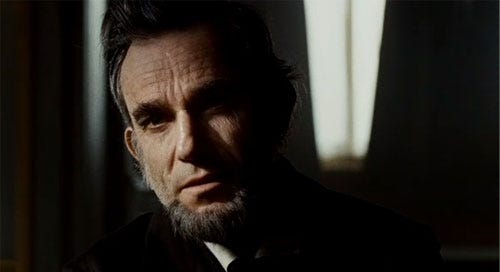Spielberg Out of the Spotlight: "Lincoln"
In the weeks leading up to the November 16 release of the much-hyped “Lincoln,” Sam Watermeier will look back at director Steven Spielberg’s less popular films, his work outside the spotlight.

Spielberg is hardly out of the spotlight this week, as his new film "Lincoln" is receiving rave reviews, including from fellow Yapper Christopher Lloyd. A large step up from the schmaltzy "War Horse," "Lincoln" beats strongly with the heart of Old Hollywood, but it lacks the contemporary grit of Spielberg's best historical reflections.
The following was previously published by The Ball State Daily News:
Cultural memory does not merely reside in photographs and films. It is produced by them, or so theorized media critic Marita Sturken in a 1997 essay that’s particularly applicable to the subject of Steven Spielberg’s new film, “Lincoln.”
Our impressions of President Abraham Lincoln, the 16th U.S. president, are based largely on the stately images of the man. (He was the first president to be photographed extensively.)
Spielberg and actor Daniel Day-Lewis further crystallize the watershed figure, revealing the man behind the legend without reducing his iconic stature. However, the film does reduce some of the history he helped shape.
Set on the heels of Lincoln’s re-election in 1865, the film follows his attempt to pass the 13th Amendment, which would abolish slavery.
Like any great historical drama, “Lincoln” manages to stir suspense out of the inevitable. Although we all know the 13th Amendment passed, the film keeps viewers on the edge of their seats as it shows Lincoln and his cabinet pushing the bill on the House of Representatives.
Spielberg and screenwriter Tony Kushner bring a frenetic energy to this world of politicking and policy making. But they fail to reveal the harsh reality of slavery that prompted the amendment. It’s surprising that these artists, who have respectively explored such heated topics as the Holocaust and homosexuality, would shy away from this subject.
Spielberg and Kushner focus more on authentically portraying Lincoln than the climate around him. In lesser hands, Lincoln could be a larger-than-life caricature, but they paint him as a gentle, vulnerable leader rather than an impervious icon.
Day-Lewis elegantly embodies their interpretation, giving Lincoln a soft, reedy voice and slight limp.
Cinematographer Janusz Kaminski further underscores Lincoln’s humanity, enveloping him in shadow rather than saintly light. His camera also lingers on Lincoln’s weak stance and shuffling feet, at one point zooming in on him gripping furniture for support — an impressive focus on detail for which Spielberg also is responsible.
It’s the world around Lincoln that feels underdeveloped. Not only is the reality of slavery practically omitted, but Lincoln’s rocky relationship with his wife Mary Todd (Sally Field) is merely tacked on. The scene in which Lincoln argues with her over the death of their child is well-acted but jarringly out of place. It feels like a last-minute attempt to add some shades of anger to the otherwise gentle man.
In these regards, the film doesn’t completely succeed in bridging the gap between the personal and the political — it clearly favors the latter. But that seems fitting in this politically fueled year. Although it is a mere coincidence that the film is arriving shortly after a presidential election, the timing adds weight to the already hefty and powerful drama. As Lincoln says in the film, “Time is a great thickener of things.”
Like many of Spielberg’s films, “Lincoln” is a bit uneven and sugarcoated. But it’s also a timely and stirring celebration of the human spirit that would make our current president proud, as it is about the very bedrock change he aims to make possible.


